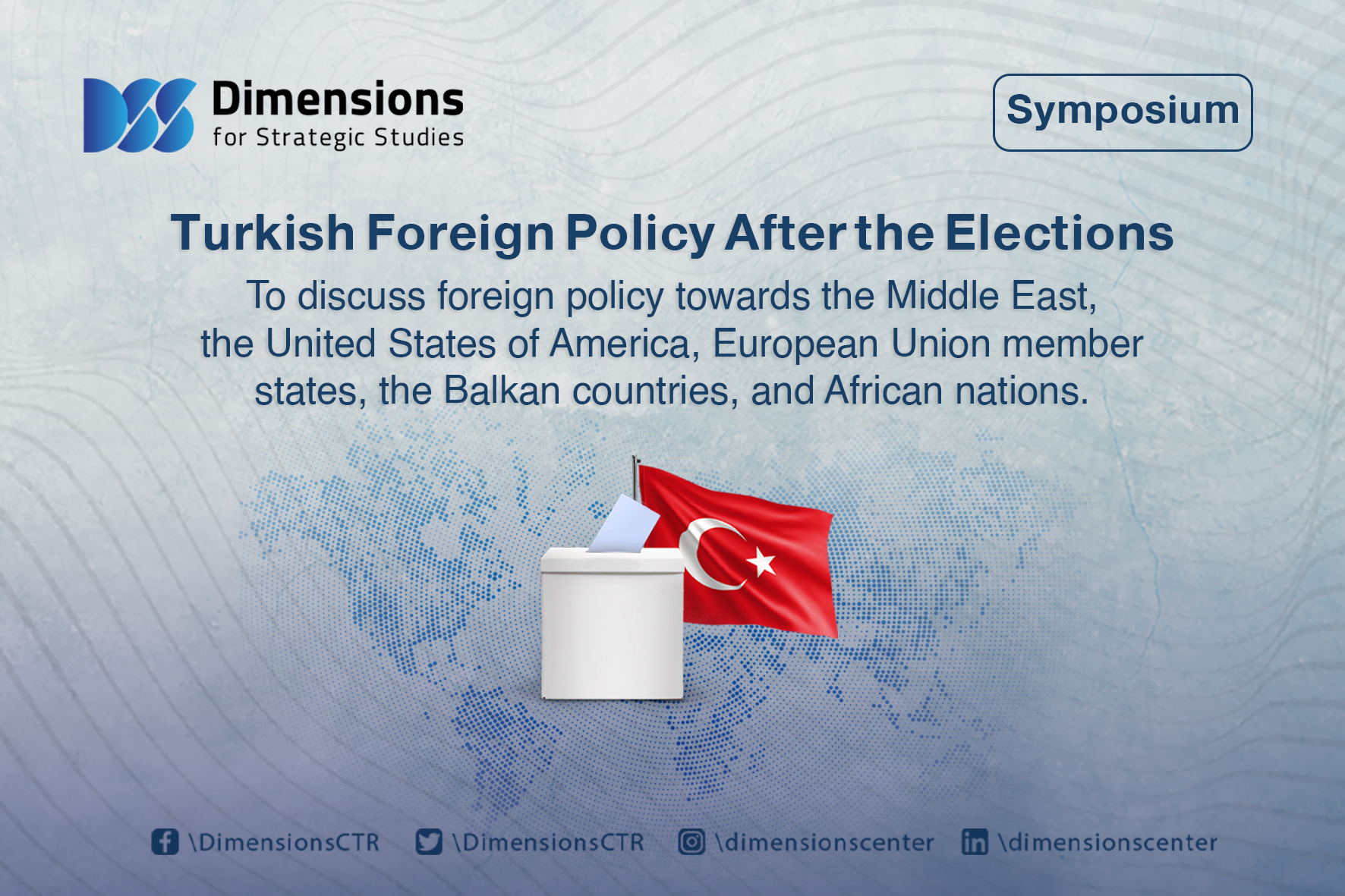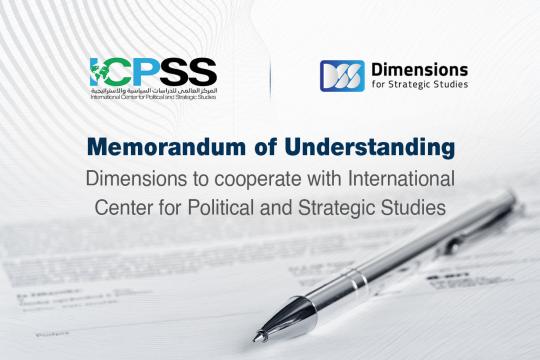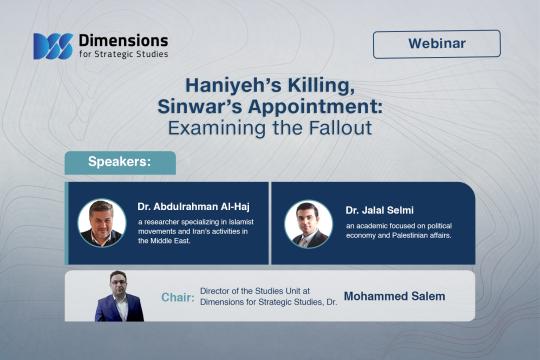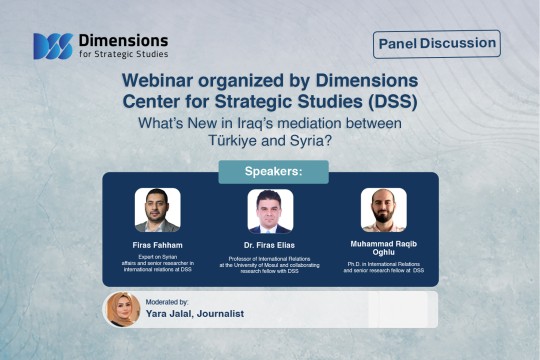
Turkey's Foreign Policy Toward Various Countries in the Middle East, Europe, and Africa
2023-07-284191 view
The workshop was moderated by Mohammed Raqib Oğlu and featured keynote speakers including Turkish Professor Dr. Ahmet Öysal, Dr. Fatih Fuad Tunçer, Dr. Ensar Gucuk Altan, and Professor Talha Koşa.
Following the electoral victory of Turkish President Recep Tayyip Erdoğan, the Dimensions Center for Strategic Studies (DSS) organized a comprehensive workshop to analyze and discuss Turkey's evolving foreign policy strategies. Conducted via Zoom, this session provided a platform for a detailed conversation on Turkey's diplomatic relations with regions like the Middle East, the European Union, the United States, the Balkan countries, and nations within Africa.
Guided by moderator Dr. Mohammed Raqib Oğlu, the workshop benefitted from the insights of several distinguished experts, namely Professor Dr. Ahmet Öysal, Dr. Fatih Fuad Tunçer, Dr. Ensar Gucuk Altan, and Professor Talha Kosa. Their colattendees,xpertise enriched the dialogue, offering attendees a nuanced understanding of Turkey's foreign policy trajectory in these changing times.
During the workshop, Dr. Ensar Gucuk Altan provided a comprehensive overview of Turkey's evolving ties with African countries; as under the leadership of the Justice and Development Party (AKP), Turkey embarked on a deliberate journey to deepen its engagement with Africa, adding that the years between 2005 and 2010 were especially transformative, marking a significant upswing in diplomatic relations between Turkey and various African nations.
Dr. Altan emphasized that political ties have been fortified and Turkey began to make its presence felt in these countries through its soft power. To bolster people-to-people connections, the Yunus Emre Cultural Institute was established, aimed at fostering cultural and social engagement with African communities. The Turkish government has been proactive in opening up and cultivating relationships with African societies.
Furthermore, Dr. Altan underscored the importance of economic collaboration. Beyond political diplomacy, Turkey has actively pursued both trade opportunities and cultural exchanges. This commitment was evident in 2008, when Turkey organized forums in collaboration with the African Union, signaling to African leaders its sincere interest in fostering a deeper, mutual relationship.
Dr. Altan also touched on a recent development in Turkey's relations with African nations: the burgeoning military cooperation. Turkey has dispatched drones to several African countries, enhancing their technological capabilities. Furthermore, Turkey has taken an active role in training military forces and police personnel in numerous African countries, ensuring they are better equipped to fulfill their duties. Additionally, Turkey has become a significant arms exporter to countries like Tunisia and Morocco.
In discussing Turkey's relations with European Union countries, Turkish Professor Talha Kosa pointed out that there exists a palpable animosity towards Turkey in both Brussels and Washington. Over the past 15 years, this hostility has been increasingly on public display from some countries. Dr. Kosa opined that these nations would prefer a Turkey without its current President Erdogan and his steadfast policies. He suggested that they want Turkey to abandon its principles in favor of aligning more closely with Western policies.
Dr. Kosa indicated that certain powers, including American military forces stationed at the Pentagon, have adopted a hostile approach towards Turkey and have even imposed sanctions on the country. Nonetheless, these antagonistic endeavors have not succeeded in achieving their goals.
Regarding the European Union, Dr. Kosa highlighted a more pragmatic stance in dealing with Turkey, despite the apparent animosity coming from Greece. In this era, Turkey has begun normalizing relations with European countries, seeking to get them back on track. Dr. Kosa also noted that the Russian-Ukrainian war has shifted the regional dynamics, making European countries increasingly wary of losing Turkey as an ally, particularly given their current needs.
During his Zoom talk, Dr. Kosa stated that the F-16 deal would be a priority for Turkey's relationship with the United States, and the relations with the West would be evaluated based on past strategies and developments. He believes concrete steps will be taken concerning visa issues.
Furthermore, Dr. Kosa clarified that recent decisions made at the NATO summit served Turkey's interests, transforming previously negative relations into positive ones. However, he cautioned that improvements would not happen overnight, but would rather be a gradual process.
Discussing Turkey's relations with Balkan countries, Turkish scholar Dr. Fatih Fuad Tunçer pointed out that there has been security cooperation between Kosovo and Turkey, especially concerning the successful arrest of a cell belonging to the FETÖ organization in 2018. He explained that Turkey's export of drones to Kosovo has favorably altered the perception of Turkey among the Kosovar people.
Tunçer stated, "We know that Kosovar-Serbian relations have deteriorated further after the Russo-Ukrainian war," noting that Turkey's relationship with Serbia had also declined due to Turkey's support for Muslims in Bosnia and Herzegovina.
Moreover, Tunçer highlighted that post-COVID-19, relations have improved between Turkey and Balkan countries. Turkey's NATO membership makes these nations more inclined to bolster their relations with Ankara and, by extension, with NATO—a trend evident in the statements from Balkan officials.
He added that coinciding with the Russo-Ukrainian war, Turkey exported Bayraktar drones to Balkan countries. He emphasized that Turkey's defense industries have played a significant role in establishing new partnerships in the region.
Regarding relations between Turkey and the Middle East, Dr. Ahmed Öysal said that Turkey's strengthening relations with the West necessitates normalization with Arab countries. Many Arab nations are experiencing a void in their relations with Western countries, especially the United States. This situation compels them to enhance cooperation with other nations, including Turkey, to preserve their national security.
Öysal pointed out that Erdogan's recent visit to the Gulf was extremely successful, with agreements signed and investments reaching approximately $125 billion. Öysal also mentioned that there is a drone deal with Saudi Arabia and a military base in Qatar, suggesting that similar agreements could potentially be reached with Egypt and Libya, with growing expectations for bolstering these alliances.





